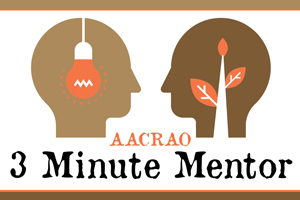 "3-Minute Mentor" is an occasional
"3-Minute Mentor" is an occasional Connect
column delivering bite-size career advice from higher education leaders, writers, and researchers. If you or someone you know can offer insightful professional development tips, please contact the Connect editor.
In any career path, it is easy to see peers as competitors or to compare yourself unfavorably with them. But, in fact, peers can be a great source of encouragement, support, and inspiration.
Tricia Seifert, Associate Professor and Department Head at Montana State University, encourages building a community to help spur your pursuit of your personal best. Below are two significant professional insights she's gleaned during her 20-year career.
Understand the importance of community. During her postdoctoral research at the University of Iowa, Seifert observed peers falling prey to the “siren song of comparison”--looking at others’ publication success and comparing it to their own (lack of) progress.
Competition, Seifert says, can be debilitating. Instead, focus on learning from your peers as they can function as mentors too. For example, senior peers can provide a historical perspective, whereas younger peers may have insight on current climates that affect your work. Ernest Pascarella, Seifert's mentor at Iowa, impressed upon her the necessity of finding community in her peers, which she currently implements at Montana State University, encouraging monthly meetings with the students she oversees to encourage camaraderie.
Develop a larger perspective. View your work on a larger scale, not just in sight of a single institution, she advises. From working at a small, religiously affiliated school to her current position at Montana State University, Seifert’s experiences have given her a multidimensional perspective.
It’s important to see your work in a larger context, Seifert says. Understand its value in the grand scheme of things. This helps mitigate feelings of frustration in slow changing work environments, and spurs motivation and energy to continue your path. No matter how much (or how little) responsibility her role had, Seifert tried to keep this view and passion from the beginning of her career.
This important advice came from Seifert's mentor at the College of Santa Fe, Mike Yamauchi-Gleason (Director of Residential Life). He invited her to view the work at a single campus as part of the broader field.
Like most other higher education professionals, Seifert didn’t go to college with this career in mind -- she had majored in political science and sociology -- so there was a steep learning curve when entering the profession. But with the help of mentors like Yamauchi-Gleason who drilled the concept of perspective in her mind, Seifert was able to adapt and learn.